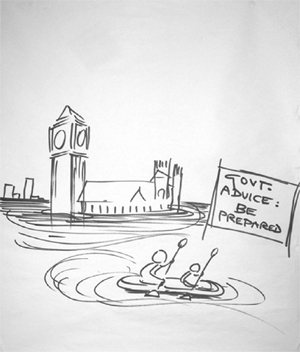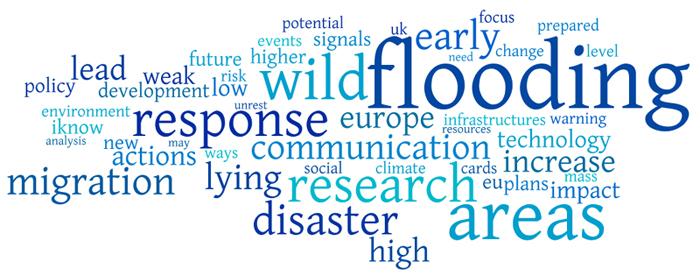005Floods in Europe cause mass migration
Blue sky Policy Alert 005
| FP7 themes | health | agro | ict | nano | energy | environment | transport | ssh | space | security |
| ERA goals | mobility | infrastucture | rtd institutions | knowledge sharing | joint programming | cooperation |
| Author(s) | Joe Ravetz, Rafael Popper, Rob Ashworth, Thordis Sveinsdottir | |
| Contributor(s) | David Alexander, Joe Ballantyne, Alastair Brown, Steve Connor, Tony Diggle, Pierre Rossel, Anna Sacio | |
| Manifestation | Sudden development | Potential impacts in Europe infrastructures  people's lives  legislation & regulation  economy & business  defence & security  government & politics  environment & ecosystems  science & technology  |
| Importance for EU |  | |
| Strategic attention | by 2030  by 2050 by 2050  | |
| Type of impact | Very negative | |
| Inspired by | Brainstorming session and group discussions in the iKNOW Workshop in Manchester (February 2010) | |
| Related to | ||
| Keywords | environment, disaster response, mass-migration, flooding | |
Wild card
Serious protracted flooding of low-lying areas leads to mass migration to higher lying areas and forces a rethink in low country policies. This could be due to e.g. sea level rise, exceptional tide, storm surge, summer drought and consequent fluvial flooding. Migration would flow in unsuspected directions, e.g. Africa which would lead to overcrowding in higher lying areas. This would lead to ghetto formation and possibly civil unrest. Social inequality would increase as higher lying areas would be inhabited by the rich whilst lower lying and high risk areas would be inhabited by the poor.
Surprises ("wild" scenario features)
The wild factor here is not necessarily the flooding itself, which could be inevitable with ongoing rapid climate change. The lack of preparedness and policy measures to cope with the flooding and the likelihood of this happening within the next 20 years would make this a wild card. The issue of migration also adds wildness to this card and the scale and unprecedented way of the migration from lower lying areas. We are at the moment too focused on local disaster plans and not holistic cross-national plans to respond to disasters such as flooding. Migration from EU countries to Africa would make this wild card very wild, as migration stream in this direction is unprecedented in recent history and many African countries are not well prepared to receive a high volume of displaced people. Higher lying and thus sought after areas would quickly become over crowded, and civil unrest is likely to follow. This would also put a strain on natural resources in the most inhabited areas and consequently energy and food safety would be threatened.
Possible interpretations
 There is a possibility of positive interpretations such as the reconstruction of damaged infrastructure or a limited disaster may force a change in the way disasters are dealt with and increase preparedness for future events. This wild card would certainly test the Business Continuity Plans that are in place as in the case of discrepancies that became apparent when the World Trade Centre was destroyed. A negative interpretation would point to the fact that no one seemed prepared for this scale of a flooding disaster. Warnings were not listened so emergency responses were not well planned or coordinated.
There is a possibility of positive interpretations such as the reconstruction of damaged infrastructure or a limited disaster may force a change in the way disasters are dealt with and increase preparedness for future events. This wild card would certainly test the Business Continuity Plans that are in place as in the case of discrepancies that became apparent when the World Trade Centre was destroyed. A negative interpretation would point to the fact that no one seemed prepared for this scale of a flooding disaster. Warnings were not listened so emergency responses were not well planned or coordinated.
Key actors
Key actors related to this wild card, include:- Scanners or "early warners" such as risk analysts, engineers and modellers that would attempt to predict level and timing of flooding and create disaster recovery plans and countermeasures.
- Shapers (i.e. enablers/inhibitors) : governments, policy makers, national and international response bodies, military, police, and rescue teams.
- Stakeholders positively or negatively impacted include insurance companies playing an important role post wild card.
Potential impacts
There would be immediate impact on local people and infrastructure and then more widespread consequences for example if London, an international financial centre, was flooded it could lead to a collapse of markets and subsequent economic disaster. Impact on the insurance sector would be vast and could even lead to a breakdown of the system. Flooding and migration could also lead to a rise of a new superpower or at least change the power balance across Europe. Mass migration from lower-lying areas would possibly lead to a ghetto formation in high risk areas whereas the poor would not be able to afford to live in safer areas. This would also put a strain on natural areas and resources and increase urban populations. The poor would live in high risk areas while the wealthy could choose to live in safer areas. This would increase inequality and social division.
Potential actions
In order to be prepared for this, focused disaster investment would be required, in addition to allocation of resources on standby to cope with the effects and for evacuation.
- Policy actions
Early actions: Policy makers would need to use existing evidence to prepare.
Early reactions: Preservation of continuity in relocation; Provision of essential services Preservation of critical infrastructure; Relocation planning, taking into account the hazard areas.
- Business actions
Early actions: All encompassing disaster planning and creation of contingency plans for businesses.
Early reactions: Recovery of productivity and market position.
- Research actions
Early actions: Look at indirect/secondary implications of the disaster and from there develop ways to prevent it; Find ways to artificially increase land space; Develop ways to evacuate the towns efficiently and quickly; Exploring possible role of civil society in disaster communication and response management; Economic market analysis would need to be carried out.
Early reactions: Continuing economic market analysis; Identification of low hazard areas; Research would also need to focus on social and welfare issues
Weak signals
Weak signals that indicate the unpreparedness include the absence of measures to respond to such a situation. Organizations seem and concern of organizations and people in general. We are seeing an increase in flooding in low lying areas in Europe, recently we have seen flooding on the west coast of France the west coast of France (a nation with similar climate and level of development to the UK) has just seen storm winds and sea surges, with the loss of 45 lives and a national emergency. It is also a weak signal that many low lying places seem to be very ill prepared for flooding. An example of this would be St Ives and Zennor, who were flooded in April 2009. These places had flood protection implemented but according to the council, lacked drainage solutions to quickly get rid of surface water. The public also seemed unaware of what measures they could take in protecting their homes and businesses. Flooding response in the UK in 2007 demonstrated further how unprepared many places are for severe flooding and how vulnerable infrastructures are, such as railway and road system. Many roads were closed and train services suspended. Officials were later criticised for a high level of unpreparedness and slow response. Also armed forces were overstretched in rescue operations around the country.
